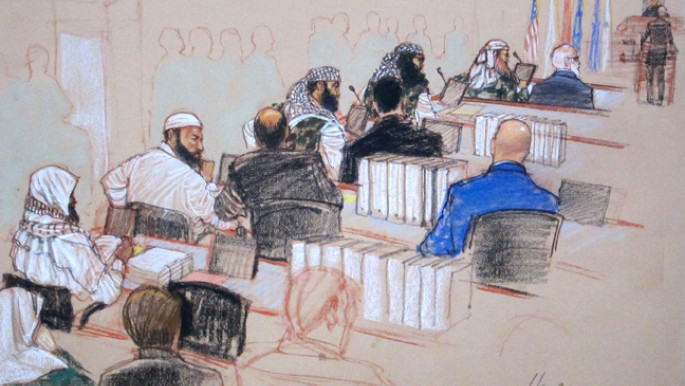Secret tapes of alleged 9/11 plotters at centre of Guantanamo war crimes hearing
The recordings are of phone calls intercepted by the US government, in which Khalid Sheikh Mohammed and three of his co-defendants apparently discuss the impending attacks.
The calls were made between April and October 2001 and contain coded discussion assisting the conspiracy, according to military prosecutors who intend to present the tapes as evidence at the trial of the alleged 9/11 architects.
But the existence of the tapes remained secret for 15 years, prompting questions about how much US spy agencies knew about the deadliest terrorist attack in history before it happened.
The "9/11 five" are accused of war crimes in connection with the Al-Qaeda attacks that killed 2,976 people when two hijacked aircraft crashed into the World Trade Center towers, a third into the Pentagon and a fourth in Pennsylvania almost 18 years ago.
The tapes and transcripts were not handed to the defence team until 30 September 2016, prompting them to ask questions about exactly when, and how the government got hold of the information.
These requests went unanswered, and two years later - at the end of August 2018 - the defence learned a Protection Order preventing them from finding out about the sources and methods of collection had been issued.
Statements heard in court suggest the recordings were acquired before the September 11 attacks, but were not listened to or analysed until later, when they were translated and decoded by an FBI analyst.
 |
|
| Khalid Sheikh Mohammed was transferred to Guantanamo Bay in 2006, three years after his capture. [DoJ] |
Information about the tapes came out on Monday when James Connell, the defence lawyer for Ammar al-Baluchi, raised the ongoing issue of the restrictions on his team's access to classified information, that he said hindered his client's ability to properly challenge the evidence against him, as guaranteed by the Sixth Amendment.
"The order restricts me from making any reference or asking any question during any session of the commission that could tend to reveal or could conceivably elicit information regarding the classified source or method," stated Connell.
Speaking for the government, military prosecutor Clay Trivett said that how they acquired the tapes remained a protected source; revealing it would constitute a threat to national security - but that the defence would have the opportunity to cross-examine the FBI linguist at trial.
Prosecutors say the voice samples used by the linguist to identify the defendants were not acquired during the infamous CIA rendition, black site detention and "enhanced interrogation" programme.
This week's court proceedings at the Military Commission are the 34th pre-trial hearing in what has been described as "the biggest criminal case in US history" though a date for full trial is yet to be set.
"To me, the most significant part of this, is what it shows about the US investigation prior to 9/11," said Connell. "What they could have known, and the sources and methods are important to know the scope of the government's knowledge prior to 9/11."
The question of whether or not the US was actively engaged in hostilities with Al-Qaeda at the time of the 9/11 attacks is a central issue to the trial.
 |
|
| The five defendants in the 9/11 case sit in court at a pre-trial hearing with their interpreters and defense teams. [Janet Hamlin] |
It's not clear at what point the government concluded that the calls they intercepted related to the 9/11 plot. If they knew of the plot beforehand and did nothing, it would, argues Connell, undercut the argument the US was at war with Al-Qaeda at the time.
The assumption that the crimes the men are accused of were committed during active hostilities with Al-Qaeda provides the basis for the US' decision to try them at the Guantanamo Military Commission rather than in civilian courts.
"If they don't prove this war element, the men are not guilty of war crimes," said Connell, a finding that could trigger the transfer of the trial to a federal court.
President George W Bush only publicly declared war on Al-Qaeda with the launch of Operation Enduring Freedom, a month after the attacks, on October 7, 2001. For its part, the prosecution argued that 9/11 is sufficient basis for war crime hostilities.
Open and closed sessions in the hearing are set to continue until the end of the week, with many issues still to be litigated, before military judge Parella - the second judge to preside over the case - can set a trial date.
Katy Stone is in Guantanamo Bay to cover pre-trial hearings at the Military Commissions for The New Arab.
Follow her on Twitter: @KatyRoseStone





 Follow the Middle East's top stories in English at The New Arab on Google News
Follow the Middle East's top stories in English at The New Arab on Google News


